Sheet Pan Roasted Veggies
Whether you’re here because you are a roasted veggie newbie and you want to learn how to make Roast Vegetables for the first time or you just need a refresher on the details like what temperature is best for roasting vegetables or how long to roast vegetables, you have found the resource you’re looking for!
Use this recipe, video and photos as general guidelines for any combination of roasted veggies. They’re the perfect weeknight side dish, great for meal prep veggies, to serve for a holiday side dish.
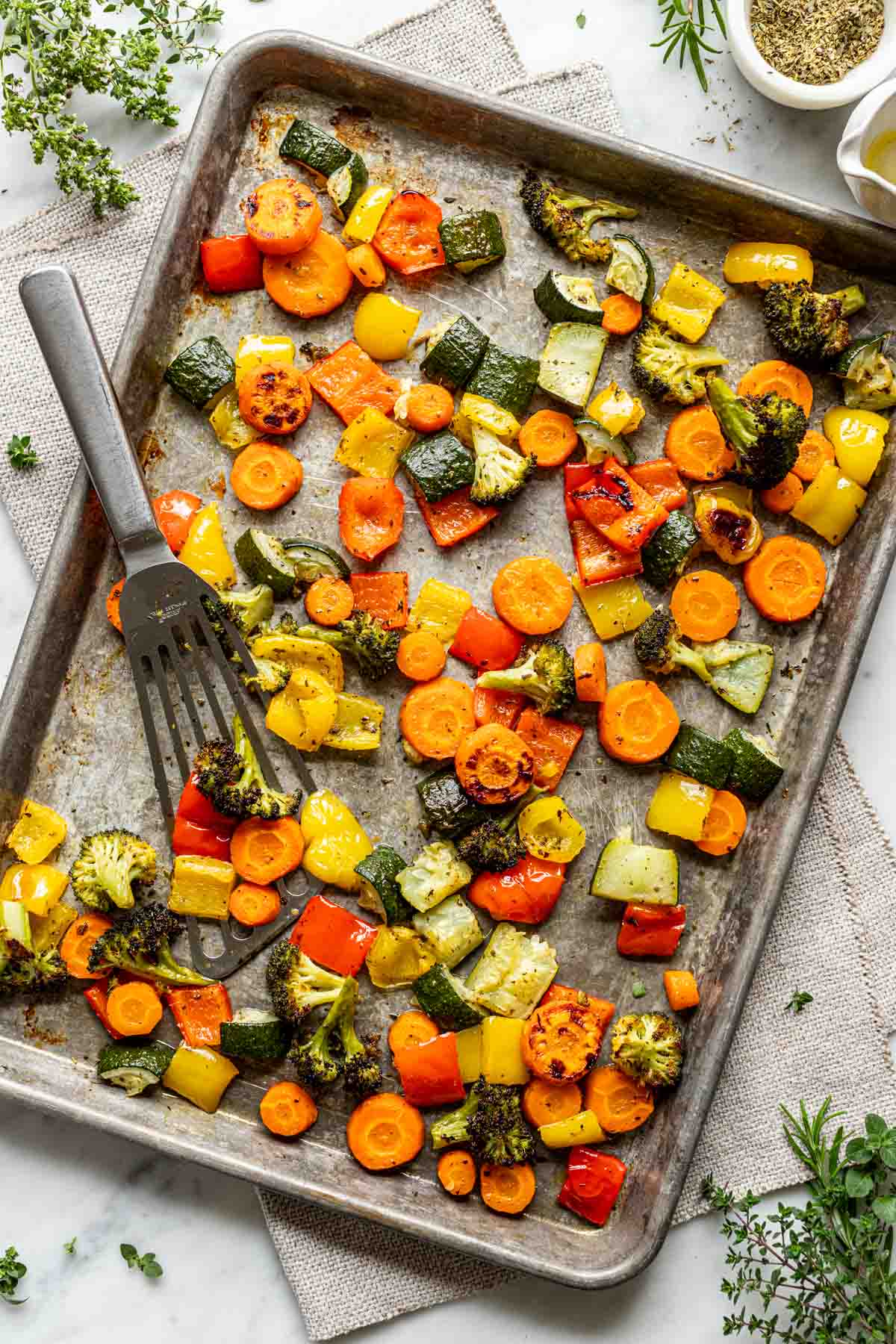
Table of contents
We Love Roasted Veggies Because:
- You can use a blend of vegetables!
- The veggies cook on one sheet pan, and they are done at the same time.
- They can be customized with all sorts of seasonings
- They can be prepped ahead for meal prep and reheat well!
- They are hands-off! They’re a prep ’em and forget ’em kind of a recipe that requires very little babysitting!
Culinary School Note: In culinary school, we were taught to roast each type of vegetable on its own separate sheet pan. While this is practical in a food service setting where you are roasting a much larger volume of veggies, at home it’s not so. This technique, of roasting the veggies all together, works well as long as you cut the veggies accordingly. Read on for more tips on how to get perfect results!
Classic Roasted Veggie Side Dishes
Over the 20 years I have been a professional recipe developer, specializing in seasonal produce, I have shared many roasted veggies recipes! Here are just a few!
Ingredients for Sheet Pan Baked Vegetables

Here’s one list of the combinations of vegetables you can roast. Keep in mind, you can swap these veggies out for your favorites or whatever you have on hand. I have also tested this with other vegetables. Full measurements are in the recipe card below.
- Carrots: Peel your carrots and cut them into 1/3-inch slices.
- Bell Peppers: Cut them into large dice, or swap them for delicata squash, seeded and cut into half moons. seeded and cut into half moons
- Broccoli: Cut the broccoli crown (or cauliflower) into florets.
- Zucchini: Cut your zucchini into 1-inch chunks, or halve brussels sprouts instead.
- Olive Oil: Use extra virgin olive oil or something neutral like avocado oil.
- Seasonings: Dried Italian herb blend, Kosher salt, and black pepper.
Pro Tip For Cutting Veggies for Roasting:
- Hard Vs Soft: Some veggies cook faster than others. In general those that are hard (like carrot, parsnips, celery root, beets or butternut squash) will take longer to soften than those that are higher in water content and softer like like bell pepper, green beans, asparagus, summer squash or zucchini.
- Cut Size: Cut the veggies smaller if they are hard and larger if they are soft
- Onions and Brassicas: Any color of onion (red, yellow, sweet or white) and cauliflower, broccoli and Brussels sprouts) will cook at an intermediate rate – so cut them into bite-size uniform pieces.
How To Make Sheet Pan Roasted Vegetables

Step 1: Preheat
Preheat the oven to 425 degrees F.
Step 2: Season Veggies
Toss the chopped veggies, oil, herbs, salt and pepper in a large bowl to coat them.

Step 3: Add Vegetables to Sheet Pan
Spread the seasoned veggies in a single layer onto a large, rimmed baking sheet. You can line the baking sheet with parchment paper or aluminum foil for easier cleanup here.
Spacing: It’s important to roast the veggies in an even layer so that they do not overcrowd the pan. They will brown better and cook more evenly this way.
Step 4: Roast Veggies
Transfer to the oven and roast, stirring once or twice, until browned and tender inside when tested with a fork, 30 to 37 minutes (see note.) Serve hot or warm.
What if they aren’t all done at the same time?
This happens sometimes, and don’t worry! Sometimes the softer veggies are starting to dry up or shrivel a bit while the harder veggies are not quite fork-tender. There’s an easy fix!
- Simply scrape the veggies into a large baking dish (like a 9 by 13 lasagna pan) and cover with foil.
- Pop them back into the oven and roast for another 10 minutes or so.
- This will prevent too much additional browning, but give the veg more time to soften.

FAQs for Oven Roasted Vegetables
What is the best temperature to roast vegetables in the oven?
The temperature we recommend to best roast vegetables in the oven is 425 degrees Fahrenheit. The veggies benefit from high temperatures. While it is possible to roast veggies in a hotter oven, like 450 degrees F, we are not recommending it for mixed roast veggies. When blending together soft and hard veggies (and those with a high sugar content) it is a safer bet to opt for 425 so the vegetables do not burn. Use the oven rack in the middle of the oven as the bottom of the oven is often too hot and the bottom of the veggies (where they touch the pan) will scorch.
How long do they take?
Time your veggies depending on what combination you choose. Softer veggies like peppers, broccoli and zucchini will be ready at around 30 minutes, while dense vegetables like delicata squash and brussels sprouts will take a little longer (35 minutes or so.)
What is the best pan to use to roast vegetables in the oven?
Any sheet pan or baking sheet is good for roasting vegetables in the oven, but you want to make sure it’s large enough that you can spread the veggies out in one layer without being too crowded. We do not recommend a dark rosting pan or baking sheet. If you’re making more veggies, use two sheets or bake them in turns.
What veggies are best for roasting?
So many veggies lend themselves to oven-roasting! Root vegetables, cruciferous veggies, bell peppers, red onion, and even some soft vegetables are great when roasted. You can even add in leafy greens (prepped with a coating of oil, salt and pepper) in the last five minutes. It’ll char up a little bit and wilt down with the other veggies.
If you are roasting mostly soft veggies but want to add in slower cooking vegetable you can cook them in sages like the roast veg recipe I developed for Eating Well. Simply give the harder veggie a head start, then stir the remaining vegetables in and continue roasting.
Should vegetables be roasted on parchment paper?
In culinary school, we were taught to roast vegetables directly on the sheet pan. You can add a layer of parchment but it will slightly reduce the amount of browning. Opt for parchment paper to reduce clean-up.
What to Do with Mixed Roasted Vegetables
Here are some options for what to serve with oven-baked vegetables.
- Pizza: Freestyle a homemade pizza. Start with our whole wheat pizza dough with a base of pesto, alfredo sauce or marinara and then top with the roasted veggies, mozzarella cheese and or goat cheese. Top with toasted pine nuts once it comes out of the oven.
- Eggs: I keep them on hand to add veggies to my breakfast too. I’ll either make a roasted veggie breakfast scramble, add to a breakfast pita, breakfast burrito or add to a frittata like our frittata with ham and asparagus.
- Grain Salad: Add them to a grain salad. For example, our Roasted Sweet Potato Brown Rice Salad would work- just use these veggies instead of the sweets!
- Seafood: In the summertime, we love a seafood feast. I’ll make steamed lobsters and boiled potatoes. Then I’ll do up a mass of summer roasted vegetables (including red bell peppers, eggplant, zucchini, and corn cut off the cob) I’ll season the veg with Old Bay seasoning instead of the Italian seasonings. It’s an amazing combo! We also love it with Pan Fried Fish and other stovetop seafood recipes.
- Salad: For lunch I’ll top my salad with leftover roasted veggies, chicken and drizzle with whatever salad dressing I have on hand for the week.
- Chicken: Serve with classics like chicken. Make a roast chicken, then while the chicken rests, pop these veggies into the oven.
- Beef: Pair with pan-cooked steak, like our Filet Mignon recipe, or other stovetop beef dishes.
- Pork: Choose a pan cooked pork chop recipe so the oven can be used for the veg.
Make Ahead, Storage, Reheating
- Make Ahead: To prep this recipe, chop the vegetables ahead of time.
- Leftovers + Storage: Store any leftovers in an airtight container for up to 5 days in the refrigerator.
- Reheating: Reheat in the microwave for one minute per serving. Air fry for four minutes at 375 degrees to reheat. Add leftover roasted veggies to soup, stews or add to Buddha bowls. Try them with our maple tahini dressing!
Variations To Try and Substitutions
- Try different seasonings for a variety of flavor profiles. If you like a little spice, add some chili powder or red pepper flakes.
- If you’re pairing this dish with something like butter chicken, try adding some curry powder to your veggies.
- More simple seasonings include garlic cloves and fresh herbs, like fresh rosemary.
- Add a drizzle of vinegar, lemon or balsamic vinegar glaze for a hint of acidity.
- Parmesan cheese or nutritional yeast is a great way to add a cheesy layer to this side dish.
- Soy Sauce would be great over these vegetables – just be mindful of how much salt you add.
- Us any different vegetables that you have on hand, or personally love. We love green beans, turnips, sweet potatoes, red potatoes, onions, and more!
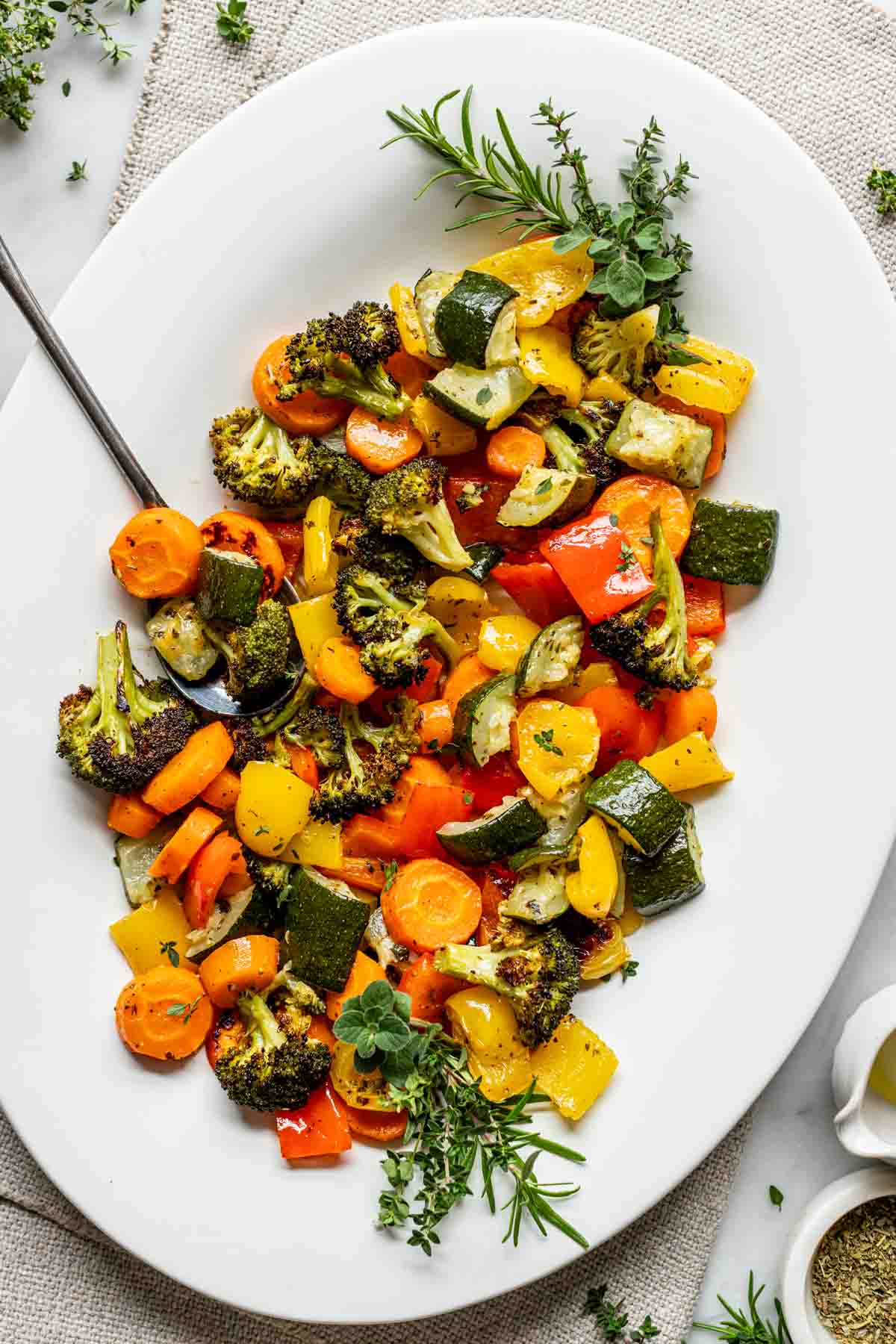
Thanks so much for reading! If you are new here, you may want to sign up for my email newsletter to get a free weekly menu plan and the latest recipes right to your inbox. If you make this recipe, please come back and leave a star rating and review. I would love to hear what you thought!
Happy Cooking! ~Katie
Print
Sheet Pan Roasted Vegetables Recipe
- Total Time: 45 mins
- Yield: 6 cups 1x
Description
This recipe for sheet pan roasted vegetables always comes in handy when you need a quick, healthy and easy way of adding veggie servings to your dinners. Oven-roasted vegetables are simple to prepare, endlessly adaptable and take very little time to pop into the oven.
Ingredients
- 3 carrots, peeled and cut into 1/2 inch slices
- 2 bell peppers, cut into large dice (or 1 small delicata squash, seeded and cut into half moons)
- 1 large broccoli crown, cut into florets (or 1 1/2 cups cauliflower)
- 1 medium zucchini, cut into 1-inch chunks (or 1 1/2 cups brussels sprouts, cut in half)
- 2 tablespoons olive oil
- 1 teaspoon dried Italian herb blend
- 3/4 teaspoon salt
- 1/4 teaspoon pepper
Instructions
- Preheat oven to 425 degrees F.
- Toss vegetables, oil, herbs, salt and pepper in a large bowl to coat the vegetables.
- Spread in a single layer onto a large, rimmed baking sheet.
- Transfer to the oven and roast, stirring once or twice, until browned and tender inside when tested with a fork, 30 to 37 minutes (see note.) Serve hot or warm.
Notes
TIMING TIPS: Time your veggies depending on what combination you choose. The peppers, broccoli and zucchini will be ready at around 30 minutes, while the delicata squash and brussels sprouts will take a little longer (35 minutes or so.)
CUTTING TIPS: Keep in mind it is helpful to cut the veggies smaller if they are hard (like carrot or squash) and larger if they are soft or have a high water content (like bell pepper or zucchini.) Brassicas (cauliflower, broccoli and Brussels sprouts) will cook at an intermediate rate- so cut them into bite size pieces.
LEFTOVERS: Store leftovers in an airtight container for up to 5 days. Reheat in the microwave for 1 minute per serving. Air fry for 4 minutes at 375 degrees to reheat. Add leftover roasted veggies to soup, stews or add to buddha bowls. Try with our maple tahini dressing!
VARIATIONS TO TRY: Use your favorite seasonings, drizzle vinegar, lemon juice, parmesan, soy sauce, add other veggies you have on hand.
- Prep Time: 10 minutes
- Active Time: 10 mins
- Cook Time: 30
- Category: Side Dishes
- Method: Oven
- Cuisine: Vegetables
Nutrition
- Serving Size: 1 cup
- Calories: 88
- Sugar: 6 g
- Fat: 5 g
- Carbohydrates: 11 g
- Fiber: 4 g
- Protein: 2 g





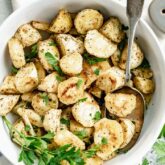
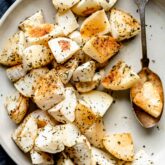
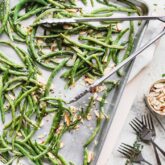
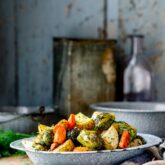
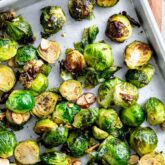
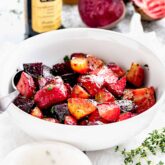
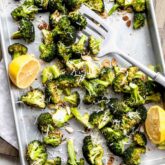

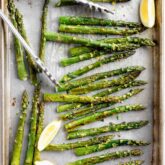
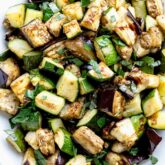
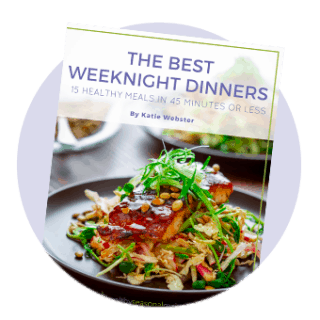

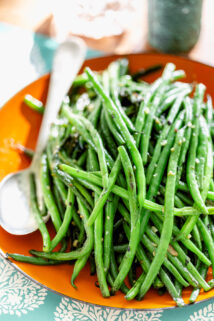
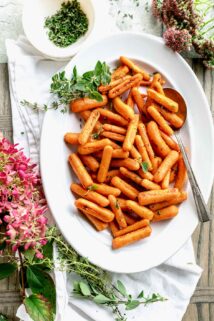
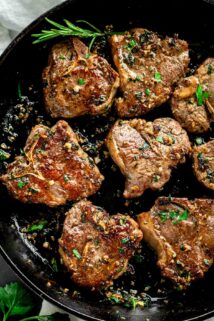
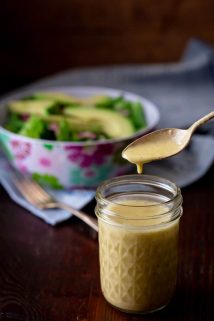
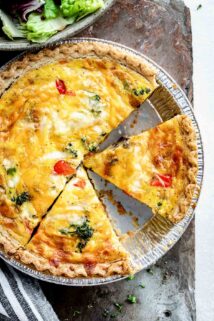
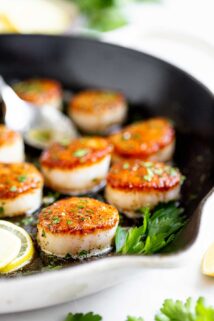
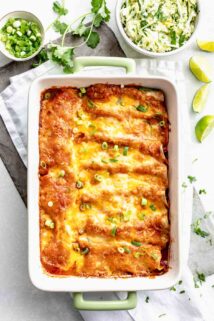
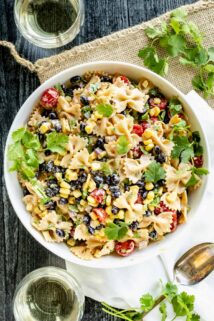

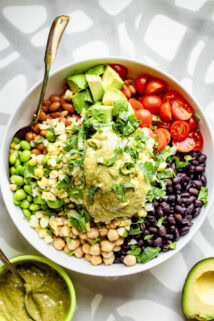
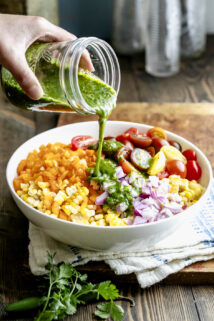
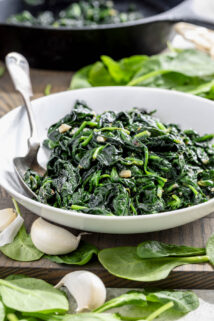
I love this roasted vegetables recipe! I haven’t made one in ages. Thanks for the idea!